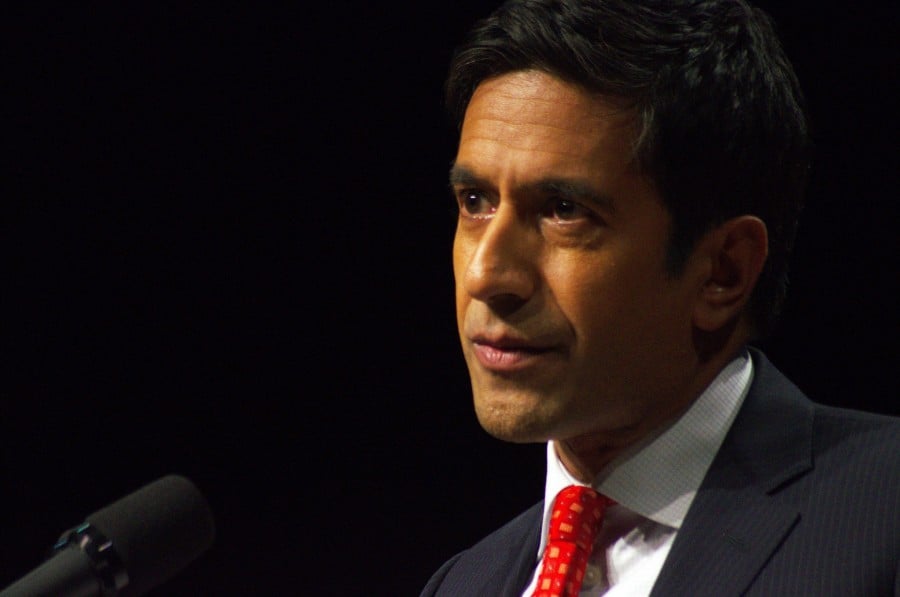Dr. Sanjay Gupta’s smile lit the stage on Nov. 29 at the third installment of the 2011 – 2012 Bryan Series. People packed the War Memorial Auditorium and an excited buzz filled the air before Gupta was introduced.
His speech, titled “Medicine and Media,” focused on the relationship between the two fields and his goal in creating a more cohesive relationship between them. As the senior medical correspondent for CNN and as a neurosurgeon actively practicing at Emory Health Center and Grady Memorial Hospital in Atlanta, Gupta strives to tell stories to people such as the story detailing the health of not only the American people, but the people of the world.
In his introduction, Kent Chabotar, president and professor of political science, cited Gupta’s numerous achievements.
“For millions of Americans, Dr. Gupta is their go-to voice for major developments in medicine, personal health and health care,” said Chabotar. “He hosts his own weekly medical affairs show, creates documentaries, and participates in a variety of other programs. Basically, he’s a medical rock star.”
Students attended the event in the hopes of gaining new perspectives and insight.
“I don’t know much about this speaker,” said senior Anne Rappe. “I’m just coming with an open ear, and hopefully I’ll learn something after tonight.”
With a self-deprecating manner, Gupta spoke about his extensive travels around the world and how traveling affords him the ability to be in contact with many different sorts of people.
“I use stories as a vehicle to communicate with people around the world,” said Gupta. “Health transcends borders … people understand health.”
As a journalist and practicing doctor, Gupta has the perspective to use his experience in his two fields to impart a powerful message to people from different backgrounds, social settings and countries.
Gupta spoke about having to use his neurosurgery knowledge on the fly in Iraq while removing a bullet from the skull of a soldier with no other equipment besides a Black and Decker drill. He also told a story about filming a CNN news report on site in Sri Lanka while a family who had recently lost their homes in the 2004 tsunami watched from the ruins of a nearby building.
His close contact with victims of natural disasters, wars and disease outbreaks has taught him a lesson that he shared with the audience.
“I believe that we are inherently compassionate beings,” said Gupta. “We are hard-wired to be altruistic.”
His attitude affected first-year A.C. Canup, who cited one of the most memorable pieces of advice from Gupta: People should smile whenever they can. She also mentioned the message of humility that Gupta emphasized.
“He talked about how lucky we are to live in the U.S., because we don’t have that many problems,” said Canup. “I felt kind of humbled.”
Gupta’s friendly attitude kept the audience engaged throughout.
However, he also cut to the heart of the matter in the second half of his speech. He spoke about the necessity of the American people to hold themselves accountable.
“What does a more healthy America look like?” Gupta asked. “We have a responsibility to ourselves.”
According to Gupta, the responsibility lies in ensuring that we create a structure that allows our citizens to be healthy.
During the question-and-answer portion of the event, the inevitable question “What is the number one health-care problem in America?” arose. Gupta smiled, sighed, and responded by saying that childhood obesity, diabetes and the chronic illnesses that follow make up the biggest health concern. This is due in part to the fact that we know the causes of these conditions and are capable of preventing them.
According to Gupta, in order to address the problem of unhealthy and overweight Americans, the country must be willing to make more healthy food attainable. He scoffed at the current state of our country’s perception of eating.
“Look at the typical American diet; it’s preposterous,” Gupta said. “It’s not how humans are meant to eat — several thousand calories followed by almost absolute inactivity.”
Gupta’s appearance introduced attendees to the idea of bringing a message to audiences who would not necessarily have access to stories or messages.
Next semester the series continues with Ken Burns speaking on March 27 and Fareed Zakaria on April 10.

